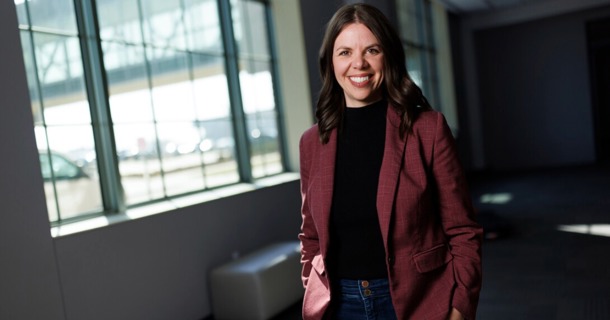Bader connects entrepreneurship, Engler program, rural Nebraska needs

Lincoln, Nebraska, Aug. 21, 2025 — Jordyn Bader, a Nebraskan with rural roots and a career in ag tech, points to a key ingredient that can strengthen 21st century agriculture and Nebraska’s rural communities.
The ingredient? Entrepreneurship.
“Entrepreneurship is the catalyst for thriving communities,” said Bader, an Ainsworth native with bachelor’s and master’s degrees in agricultural economics from the University of Nebraska–Lincoln.
Adopting an entrepreneurial mindset creates a vibrant culture where professionals want to live and work, she said, and “no one is better equipped, or more deeply invested, to solve challenges in rural communities and agriculture than the people who live there.”
Her life experiences have given Bader a deep appreciation for her rural upbringing. As a teen, she deepened her passion for agriculture through FFA activities and leadership opportunities.
“I’m a product of a rural community in Nebraska,” said Bader, whose husband, John, a Lincoln ophthalmologist, also has rural Nebraska roots. “Growing up in a remote area and agricultural community showed me the power of resilience, resourcefulness and supporting your neighbors.”
During her undergraduate years in Lincoln, she worked as a summer intern in Holdrege through the university’s Rural Futures Institute (now Rural Prosperity Nebraska) to help create strategies for recruitment of young professionals.
“There are so many career opportunities, and a fantastic quality of life and sense of community, in rural Nebraska,” she said.
Growing up in a rural community gave her wide-ranging benefits.
“My values and drive to pursue entrepreneurship were shaped by that experience,” she said. “Many of the opportunities I’ve had in my career trace back to the foundation built in my hometown.”
Post-graduation, she co-founded Marble Technologies. Headquartered at Nebraska Innovation Campus, Marble is building AI-powered automation for the meat industry. As director of industry partnerships, Bader works with stakeholders served by the company’s automation technology.
“Advancements in technology and AI are unlocking the next level of efficiencies in food and ag,” she said. “Physical AI will provide data-driven insights and a more resilient food system.”
Meat processing remains one of the most labor-intensive sectors in the food supply chain. Many tasks are repetitive and physically demanding. Bader sees this as a clear opportunity for innovation. By leveraging advanced automation and AI, Marble aims to transform the industry — streamlining workflows, enhancing safety and improving job quality.
“Automation can take on repetitive and difficult tasks, freeing up employees for higher-value roles,” she said.
Bader has found that tackling big challenges in food and agriculture requires both scientific talent and deep agricultural expertise.
“It’s been incredible to witness meat scientists work alongside engineers to build technology for this industry,” she said. “The most impactful solutions in any industry are a result of diverse teams working toward a shared goal.”
Bader points to the Engler Agribusiness Entrepreneurship Program as one of the university’s most important assets for rural Nebraska. As an agricultural economics major, she was in the first student cohort for the Engler program in 2010, earning her bachelor’s degree in 2014 and her master’s degree in 2016.
Since its inception, the Engler Agribusiness Entrepreneurship Program has helped launch more than 70 businesses in Nebraska, generating more than $147 million in lifetime revenue. As Engler reaches its 10-year milestone, the program will celebrate the entrepreneurs it has empowered and share the lasting impact of their work in a 2026 report.
Engler goes well beyond classwork. Students bounce ideas off mentors and benefit from networking. They gain insight into real-world experience by being challenged with the complications businesses often must deal with.
Engler alumni such as Bader remain involved with the program, helping current students learn from the alums’ experiences — the positives as well as the negatives.
“It is an honor to remain involved in the Engler program as a member of the advisory board and to witness the impact it is making in the lives of students and the state of Nebraska,” she said.
“Jordyn is bold, purposeful and inspiring a new generation to dream bigger, take risks and own their journey,” said Hailey DeMers, the Engler program’s chief creative officer. “Through her recent service to our program — delivering powerful messages, mentoring and creating opportunities for students — she proves that success isn’t just personal; it’s contagious.”
“I could not have predicted as an undergraduate where my career would take me,” Bader said. “I’ve learned to be willing to pivot and say yes to opportunities that challenge me. It’s been an incredible journey.”
